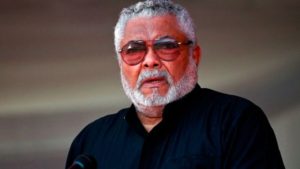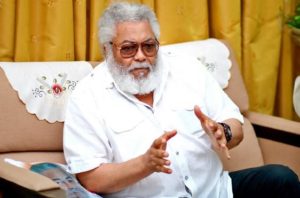John Jerry Rawlings, former military leader of Ghana who later served two terms as democratically-elected president of the country, has died, age 73.

Rawlins died Thursday at the Cardiothoracic Centre of the Korle Bu Teaching Hospital in Ghana, from yet-undisclosed causes.
In his reaction to Rawlings’ passing, Ghana’s president, Nana Addo Dankwa Akufo-Addo, declared seven days of national mourning in honour of the late president, with flags flying at half-mast during the period of mourning.
Akufo-Addo’s declaration made it clear the country was mourning a leader credited with turning around the fortunes of the West African country with a combination of strategic ruthlessness, courage and stoic determination that transformed Ghana from a laughing stock in the West African sub-region and the African continent only about two decades after its political independence from Great Britain in 1957, to an economic powerhouse and a much-respected country in the world today.
Rawlings who was born in Ghana on June 22, 1947, to a Scottish father and Ghanaian mother, was raised in Ghana and eventually joined the country’s Air Force, rising to the position of flight lieutenant in the country’s Air Force. He then led an unsuccessful coup d’etat against the ruling military government at the time headed by General Fred Akuffo. That foiled coup was launched on May 15, 1979, just five weeks before democratic elections scheduled by the Akuffo regime. But in a momentous twist of fate, another group of mutinous soldiers staged a successful coup on June 4, 1979 that forced Akuffo from office, sprung Rawlings from jail where he had been awaiting execution after being sentenced to death for his earlier, failed mutiny and installed Rawlings as military head of state.
Within weeks of coming to power, the young Rawlings, leading a group of fellow junior officers and other ranks in the Ghana armed forces under the auspices of the Armed Forces Revolutionary Council (AFRC), arrested many officers in the military regimes that preceded his, including three former military heads of state, Akwasi Afrifa, Ignatius Acheampong and the man Rawlings overthrew, Fred Akuffo.
All three former heads of state of Ghana were thereafter shot by two separate firing squads within weeks of Rawlings’ ascension of power, with their deaths witnessed by hordes of cheering crowds braying for blood.
Rawlings justified the executions on the need to “clean house” and blamed his predecessors in office and other senior government officials executed with them for the indiscipline, corruption and mismanagement that had depleted Ghana’s resources and forced many of its citizens to flee the country in the late 60s and 70s for Europe, the Americas and neighbouring countries in West Africa, especially Nigeria, to eke out a living.
While the Rawlings regime later shortly handed over power to a civilian government headed by Dr. Hilla Limann in September 1979, a restless Rawlings soon struck again, seizing power from Limann in December 1981 for what Rawlings characterized as Limann’s “failure” in managing the country’s near-comatose economy. He did not relinquish power again until 2000, during which he served out two terms as Ghana’s democratically-elected president from 1992 to 2000, after having held the reins as military strongman from 1981 to 1992.

During his nearly two decades in power, Rawlings was credited with stanching the culture of corruption that had all but brought the Ghanaian economy to its knees prior to 1979, and putting it on a steady path of economic growth and revival that continues till this day. This, perhaps, inspired the nickname of “Junior Jesus”, which many of Rawlings’ admirers gave him while he was in office, and was clearly patterned after the initials of the leader’s first and middle names (John Jerry).
However, the Rawlings’ government, especially the military regime he led from 1981 to 1992, was also widely-criticized for human rights abuses, including jailing of critics, especially by critics outside the country.
In a statement issued by the Presidency in Accra on Thursday, Ghana’s president, Akufo-Addo said: “I have directed that all national flags should fly at half mast for the next seven days in all parts of the country and I have declared seven days of national mourning from Friday 13th November 2020.” President Akufo-Addo added that it was with great sadness that he was announcing to the nation that the first president of the Fourth Republic, Jerry John Rawlings, has “joined his ancestors”.
In his reaction to Rawlings’ death, a former President of Nigeria from 1999 to 2007, Olusegun Obasanjo, who also served as military Head of State of the country from 1976 to 1979, praised the deceased Ghanaian leader as “a reliable friend, ally and confidant”.
According to Obasanjo, “I worked very closely with our departed brother within the remaining two years of his completing his second term in office, i.e.1999-2000 and during which time I had become a democratically-elected President of Nigeria. I found in him a reliable friend, ally and confidant.
“We worked together under the auspices of AU (African Union) with constructive contributions at the various fora in our joint efforts at charting a new future for Africa particularly in tackling the scourge of malaria in our continent using the platform of the African Summit on Roll Back Malaria where his participation was quite active and the quality of his contributions enriched our deliberations and pointed the way forward in dealing with the disease. He was passionate about peace, security and leadership issues in Africa.
“It must also be on record that President Rawlings played a key role in furthering the actualization of the objectives of the Africa Leadership Forum, ALF, a non-governmental organization which I founded in 1988 to develop leadership capacities in Africa in order to increase productivity of major actors in government, parliament, business and civil society,” Obasanjo said.
The late Rawlings held honourary doctors of law degree from Medgar Evers College, City University of New York, and a honourary doctorate degree from Lincoln University, also in the US.
He was a joint recipient of the 1993 World Hunger Prize.
In 2013, Rawlings received the Global Champion for People’s Freedom award by the Mkiva Humanitarian Foundation.